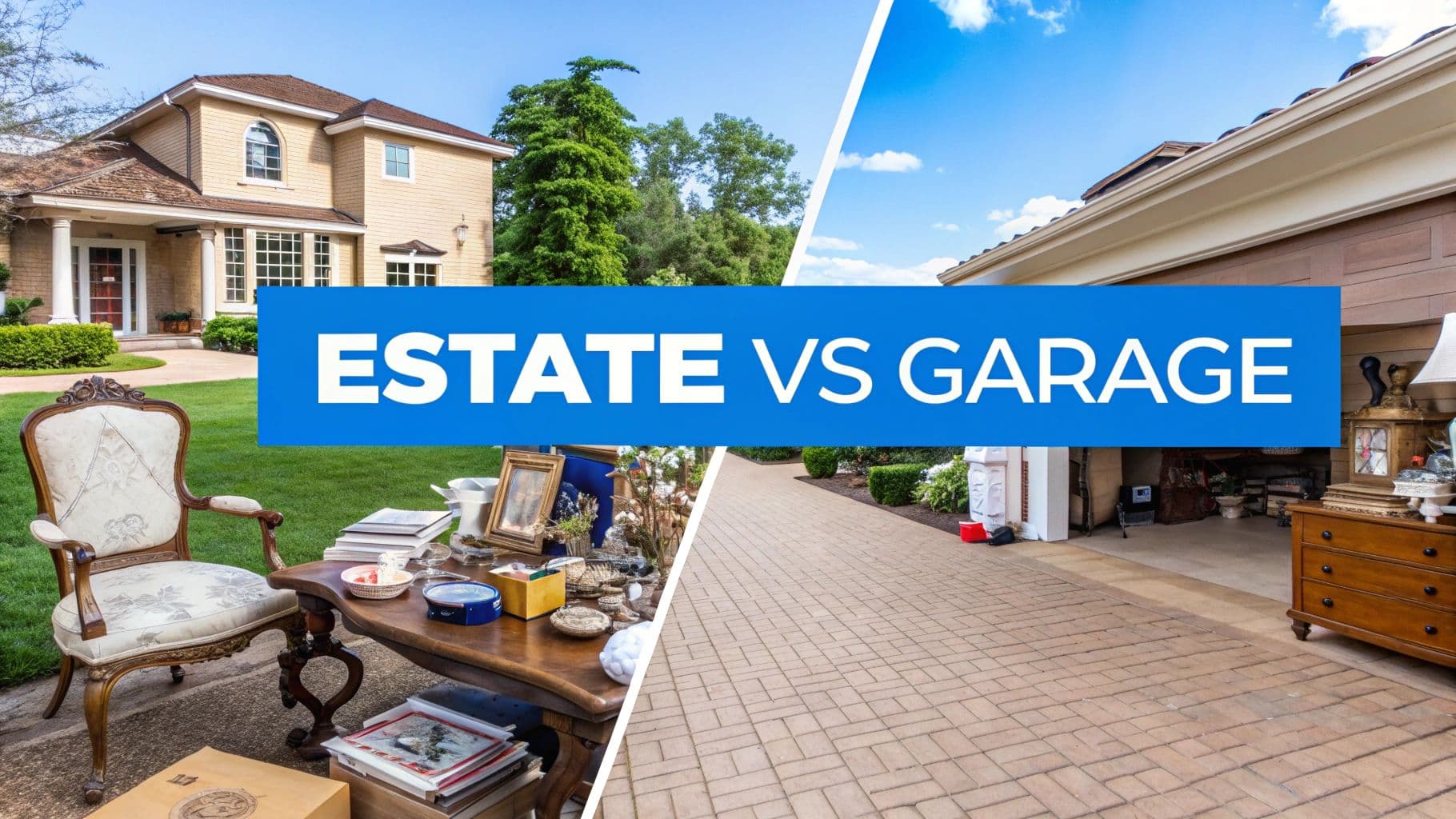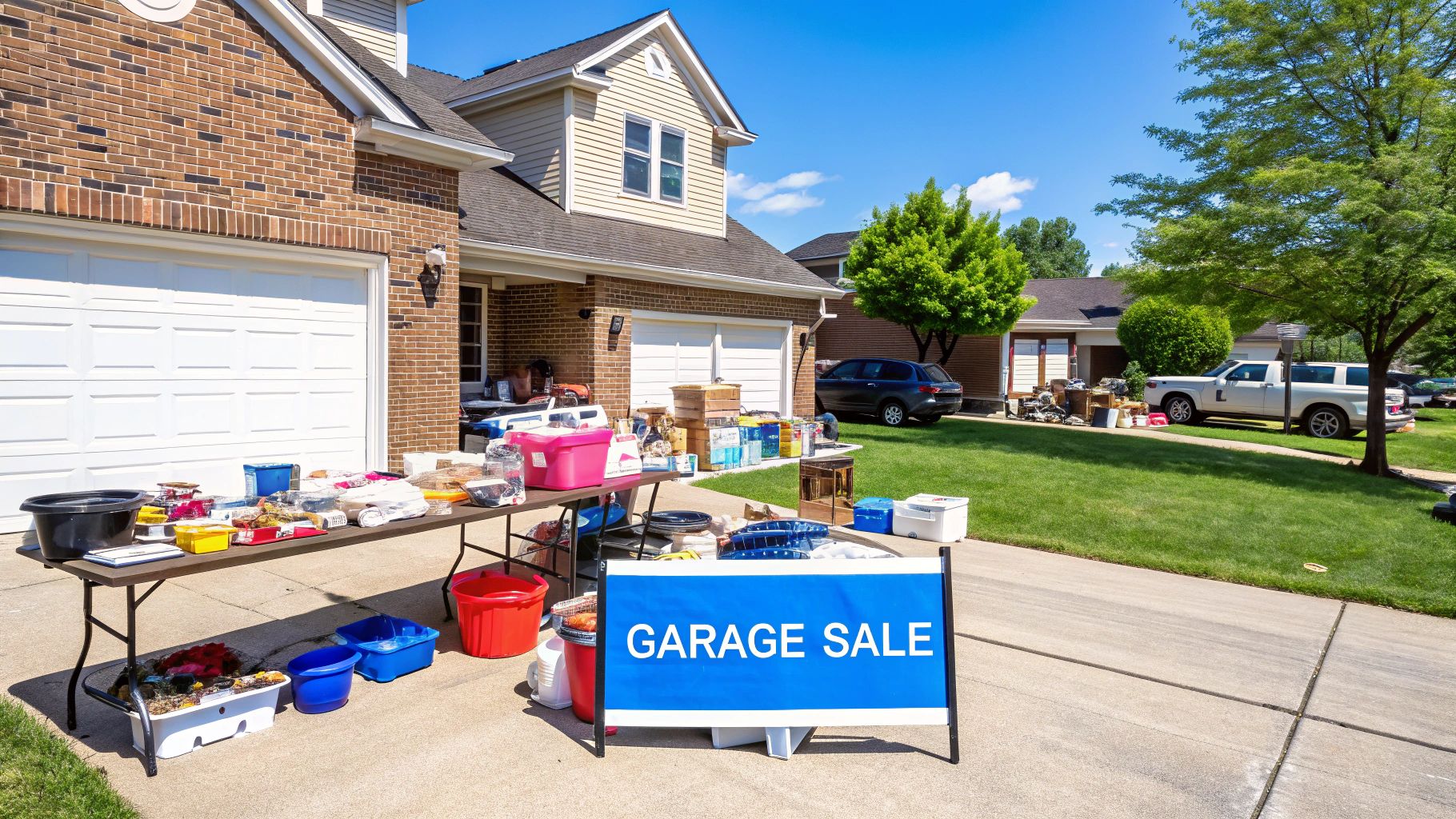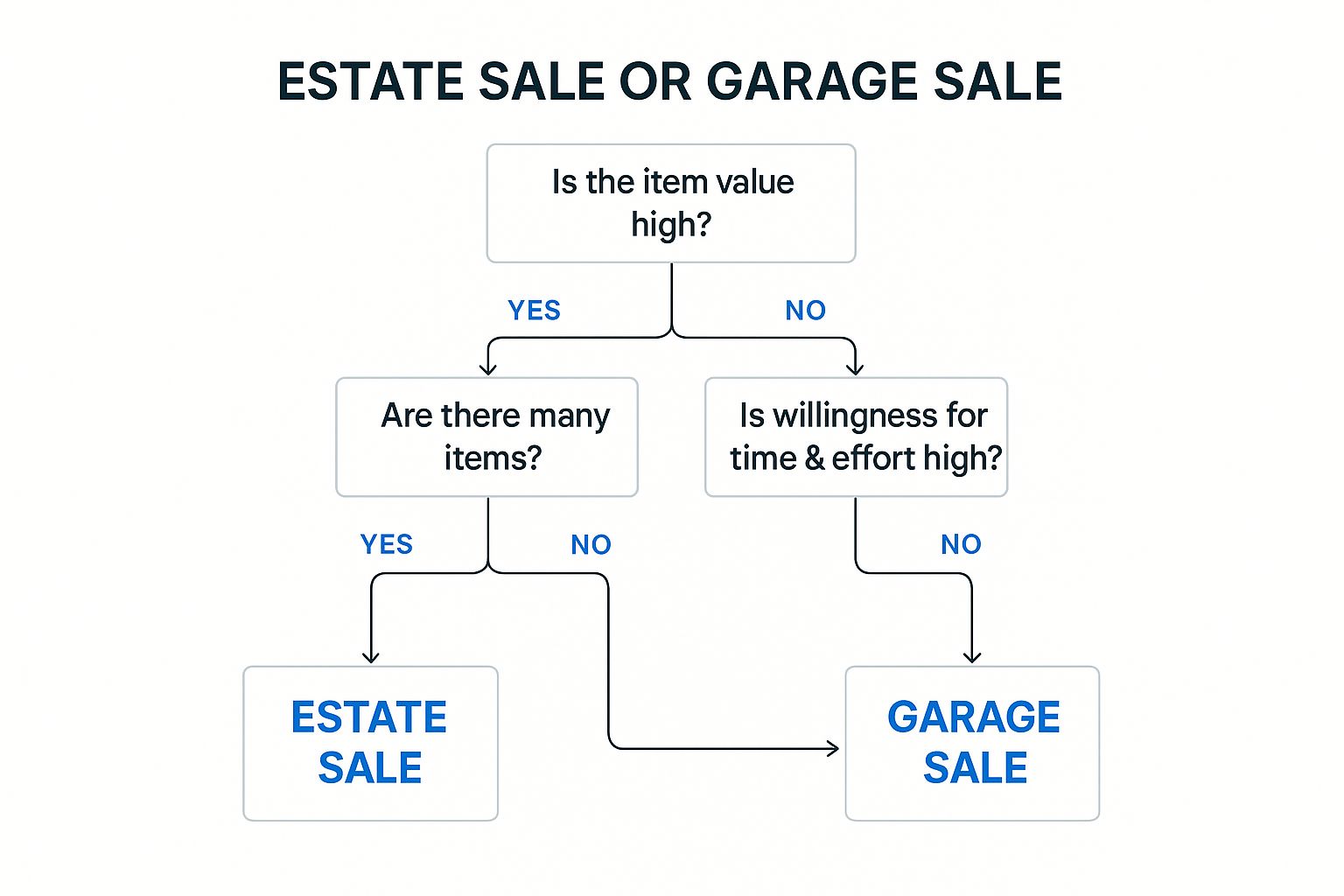Estate Sale vs Garage Sale: Your Complete Decision Guide

Understanding What Really Separates Estate Sales From Garage Sales
 Many people think an estate sale is just a much larger garage sale, but the two are worlds apart. The key difference isn't just the amount of stuff for sale; it’s the entire business model behind each event. This core difference shapes buyer expectations, marketing, and your final profit.
Many people think an estate sale is just a much larger garage sale, but the two are worlds apart. The key difference isn't just the amount of stuff for sale; it’s the entire business model behind each event. This core difference shapes buyer expectations, marketing, and your final profit.
A garage sale is a simple, do-it-yourself project to clear out clutter. An estate sale, on the other hand, is a full-scale liquidation of a home's contents, managed to get the best possible financial result.
Choosing the right type of sale is a major decision. It affects how your items are priced, who sees them, and how much money you'll make. Knowing what sets them apart is the first step to making the right choice for your situation.
The Core Operational Approach
The way each sale is run highlights their fundamental differences. A garage sale is a weekend clear-out where the main goal is to free up space. You do all the work—sorting through items, guessing at prices, and handling the cash box on sale day. Making money is great, but the primary objective is getting rid of things.
An estate sale operates more like a business. The goal is to sell assets for their fair market value. This requires a more organized method where items are properly researched, appraised, and staged inside the home to appeal to buyers. Marketing is also targeted to attract people looking for specific types of goods.
This process often involves professional help, which comes with costs but provides valuable knowledge. If you're weighing the options, you can learn more about how commissions work in an estate sale. This management style is a central point in the estate sale vs garage sale debate.
Scope, Scale, and Financial Outcomes
The financial results of each sale are directly tied to their size and scope. An estate sale is a large event that often includes everything in a house—from valuable antiques and furniture to kitchen gadgets and cars. This wide range of items brings in serious buyers, like collectors and resellers, who are willing to pay more for unique pieces.
A garage sale, however, is usually limited to what you can fit on your lawn or in your driveway. This setup tends to attract local neighbors and bargain hunters looking for low prices.
This difference in scale and buyer audience has a huge impact on earnings. A well-run estate sale can bring in several thousand dollars, while a successful garage sale might only make a few hundred dollars. You can see a breakdown of these earning potentials to understand the gap.
Ultimately, your choice isn't just about what's easier. It's about matching the sales method to the value of your items to ensure you get the best financial outcome.
The Real Cost Analysis: Investment Requirements Breakdown
 While potential earnings often take center stage, your actual net profit hinges on the total investment required. The financial debate in the estate sale vs garage sale comparison isn't simply about which one costs more, but how that cost is paid. Each path demands a significant investment—one measured in dollars and the other in personal time and effort.
While potential earnings often take center stage, your actual net profit hinges on the total investment required. The financial debate in the estate sale vs garage sale comparison isn't simply about which one costs more, but how that cost is paid. Each path demands a significant investment—one measured in dollars and the other in personal time and effort.
The Financial Outlay of an Estate Sale
An estate sale's primary cost is direct and clear: the professional's commission. This fee, typically ranging from 25-40% of the gross sales, is an investment in a complete service package. It covers appraisal expertise to secure fair market value, targeted marketing to attract motivated buyers, and the labor of staging and running the multi-day event.
A major benefit is that these fees are deducted from the final proceeds. This means you rarely have any upfront, out-of-pocket expenses. You are essentially trading a portion of potential revenue for specialized knowledge and freedom from the logistical headache.
Unpacking the Hidden Costs of a Garage Sale
A garage sale seems free of commission, but its costs are buried in your time and miscellaneous expenses. The most significant investment is "sweat equity"—the dozens of hours you will pour into sorting, cleaning, researching, and pricing every item.
Beyond your time, you must also budget for tangible materials that many sellers forget.
- Advertising: The cost of signs, posters, and potentially fees for online listings.
- Supplies: Price stickers, markers, display tables, and bags for customers.
- Logistics: Ensuring you have enough cash on hand to make change for early shoppers.
These small expenses add up quickly. When combined with the immense time commitment, they represent a real, though less obvious, investment.
To clarify these different types of investments, the table below provides a side-by-side breakdown of what you can truly expect to spend in terms of both money and effort.
Comprehensive Cost Analysis: Estate Sale vs Garage Sale
Complete breakdown of all expenses, time investments, and potential returns for informed decision-making
| Investment Category | Estate Sale Reality | Garage Sale Reality | Hidden Considerations |
|---|---|---|---|
| Direct Financial Cost | Commission fee of 25-40% on gross sales. No upfront payment required. | Low upfront costs for supplies like signs and price tags ($50-$150). | The estate sale commission is an investment in expertise that can yield higher overall prices. |
| Time Investment | Minimal for the seller. The company handles nearly all prep, execution, and cleanup. | Extremely high. Expect 40+ hours for sorting, pricing, setup, and managing the sale. | The "opportunity cost" of your time for a garage sale is a major factor. What else could you be doing with those hours? |
| Labor & Effort | Low. Professionals manage staging, customer service, and heavy lifting. | High. You are responsible for all physical setup, managing crowds, and post-sale cleanup. | The physical and mental exhaustion of running a multi-day garage sale is often underestimated. |
| Expertise & Pricing | Included. Professionals appraise items for fair market value to maximize returns. | Self-Reliant. You must research every item's value, risking underpricing or overpricing. | Without expertise, you might sell a valuable antique for a fraction of its worth or fail to sell overpriced common goods. |
This analysis shows that an estate sale is a direct financial investment for professional results, while a garage sale trades a lower cash cost for a massive investment of your personal time and labor.
Calculating Your True Return
To make a sound financial decision, you have to look past the surface-level numbers. For a professional estate sale, your net profit is the total revenue minus the agreed-upon commission. For a garage sale, your net is the total revenue minus your supply costs and the opportunity cost of your time.
An estate containing high-value antiques or collectibles might easily generate more profit, even after a 40% commission, than a DIY garage sale ever could. A professional's ability to attract the right buyers and secure much higher prices often justifies the investment completely.
Profit Potential: What You Can Actually Expect To Earn
 While you might hear about estate sales earning thousands and garage sales earning hundreds, the number that really matters is your net profit. The critical difference in the estate sale vs garage sale debate comes down to what you keep after your investment of time and money. Gross revenue is exciting, but net profit is what lands in your bank account.
While you might hear about estate sales earning thousands and garage sales earning hundreds, the number that really matters is your net profit. The critical difference in the estate sale vs garage sale debate comes down to what you keep after your investment of time and money. Gross revenue is exciting, but net profit is what lands in your bank account.
With a professional estate sale, the primary cost is the commission. However, a manager’s expertise can lead to prices 3 to 5 times higher on valuable items, often making up for this fee and then some. In contrast, a garage sale’s profit is quietly drained by the hidden cost of your own labor—dozens of hours that you could have spent elsewhere. A successful garage sale might gross $500-$1,000, but your effective hourly wage for the work involved can be disappointingly low.
How Item Type Dictates Earning Ceilings
What you are selling is the single most important factor in your potential earnings. A garage sale is generally the more profitable route for a household of everyday items—think children’s clothing, common kitchenware, and paperback books. Because these items have low individual value, a high commission from an estate sale company would eat up too much of the final sale price.
However, if your home contains even a small number of higher-value assets, an estate sale’s earning potential grows significantly. Items like antique furniture, fine art, collectibles, or power tools require a specific audience of collectors and resellers who rarely shop at garage sales. These buyers are prepared to pay fair market value, a price you are very unlikely to get in your driveway. Learning how to present these goods is key, and our guide offers essential tips on how to run an estate sale for top results.
Market Timing and Strategic Advantage
Strategic timing also creates a clear divide in profitability. Garage sales are highly seasonal, concentrated on spring and summer weekends. This saturation creates intense local competition, which tends to drive prices down as sellers compete for a limited number of bargain-hunting shoppers.
Estate sales are far less dependent on the season. Because they are marketed professionally to a specific audience and typically held indoors, they can be successful all year long. This allows you to avoid the peak "garage sale season" and its associated pricing pressures, giving you a more controlled and profitable selling event. Ultimately, your potential earnings are tied directly to matching your collection of items with the correct sales model.
Operational Reality: Time Investment And Logistics Management
The most significant factor in the estate sale vs garage sale debate is the hands-on effort required from you, the seller. Beyond the potential profit, your choice defines how you'll spend your time and energy, from the first day of planning to the final clean-up. This reality directly shapes the stress and workload of the entire event.
The Estate Sale: Coordinated Delegation
Choosing a professional estate sale means you are hiring a team to manage the project. Your main time commitment happens at the beginning, during the initial meetings and contract signing. After you hire a company, your involvement drops off significantly as the professionals take over.
Their work involves a complex set of tasks:
- Full-Service Staging: They arrange furniture and items throughout the house to create an appealing, shop-like environment that encourages sales.
- Security and Crowd Control: During the typical 2-3 day event, they manage the flow of people and protect valuable items from being mishandled or stolen.
- Complete Sale Execution: The team handles all pricing, customer questions, negotiations, and payment processing for you.
- Post-Sale Cleanout: Once the sale ends, they arrange for the removal of unsold items, leaving the property empty and swept clean.
This approach is best for anyone with limited time to spare. It's also a great fit if you're managing the estate from another city or feel that sorting through a loved one's belongings would be too emotionally difficult.
The Garage Sale: A DIY Marathon
A garage sale is the complete opposite—you are the project manager, sales team, and clean-up crew all in one. The time required is substantial and goes far beyond the weekend of the sale itself. Most sellers find they invest 40+ hours into this entirely self-run process.
Here’s what that time commitment looks like:
- Gathering and Prep: You could spend weeks sorting through closets, basements, and garages to decide what to sell, then cleaning and organizing every item.
- Pricing and Setup: This phase involves researching what things are worth (often involving a lot of guesswork), putting a price tag on each item, and physically hauling out tables and merchandise.
- Running the Sale: You have to be present for the entire sale to handle payments, answer questions, and haggle with shoppers who are looking for a deep discount.
- The Aftermath: You are left with all the unsold items. This often means a surprisingly large clean-up job and several trips to donation centers or the dump.
This path works for sellers who have plenty of free time, a lot of energy, and want full control over the process from start to finish. You trade convenience for a larger percentage of a potentially smaller final profit.
Buyer Demographics: Who Shows Up And Why It Matters
The success of your sale comes down to getting the right people to show up. Understanding your audience is a core piece of the estate sale vs garage sale puzzle because each event attracts a completely different crowd. The type of buyer who walks through your door shapes how items are valued and sold, making this a critical factor in your final profit.
The Estate Sale Audience: Professionals and Collectors
Think of an estate sale as less of a casual neighborhood event and more of a destination for a specific group of buyers. These aren't just random browsers; they are often knowledgeable individuals who came for a reason.
The crowd typically includes:
- Professional Resellers: People who buy items to stock their antique booths, online stores, or curated shops.
- Serious Collectors: Buyers on the hunt for specific pieces, whether it's rare vinyl records or vintage Pyrex, to complete a personal collection.
- Interior Designers: Professionals looking for unique furniture and decor to use in client projects.
These buyers arrive with expertise and a budget in mind. They are drawn by marketing that highlights specific high-value items, like mid-century furniture or fine art. They expect items to be properly researched and are prepared to pay fair market value for quality, understanding the prices are set with professional care.
The Garage Sale Crowd: Neighbors and Bargain Hunters
In sharp contrast, a garage sale is a hyperlocal affair. The audience is primarily made up of your neighbors, local families looking for affordable kids' clothes and toys, and casual passersby hoping to find a great deal. Their motivation isn't about finding a rare collectible; it's about the thrill of the hunt and the satisfaction of a good bargain.
This crowd responds best to simple cardboard signs on street corners and posts in local community groups. While they are perfect for helping you clear out everyday household clutter, they are not the target market for your grandmother's antique silver or specialized tools, which they would likely overlook or undervalue.
This fundamental difference in who shows up directly influences how you should price your items. Estate sale prices are typically researched and firm, reflecting market value. Garage sale pricing, however, is often based on what the homeowner feels an item is worth, leaving lots of room for negotiation. You can learn more about how these pricing strategies differ to see how audience impacts value.
Strategic Decision Framework: Choosing Your Optimal Approach
Choosing between an estate sale and a garage sale isn't a one-size-fits-all decision. The best choice depends entirely on your specific situation—what you're selling, your timeline, and how much work you're willing to do. Thinking through these factors helps you pick the right strategy to meet your goals, whether that’s making the most money, clearing out a house quickly, or keeping things simple.
What Matters Most? Your Items, Time, and Effort
Your decision really boils down to three key things: the value of your inventory, the quantity of your items, and your personal commitment to the process. Someone with a few free weekends and a garage full of household goods will approach this differently than an executor handling a home filled with valuable art on a strict schedule.
The decision tree below gives you a straightforward visual guide to help you choose the best path based on what you have and the resources available to you.

As you can see, a large inventory of high-value items points directly to an estate sale, especially if you have limited time to manage the project yourself.
Putting It Into Practice: Real-World Scenarios
Let’s look at a couple of common situations. If you're decluttering before a move and selling everyday things like kitchenware, used clothing, and old books, a garage sale is your best bet. The items don't have enough individual value to make a professional's commission worthwhile. Your main goal is clearing things out, and the profit you make is a direct result of your own work.
On the other hand, an estate sale is the clear winner when you're managing an inherited property full of antiques, fine art, or valuable collectibles. A professional's knowledge in pricing and marketing these items will almost always lead to a higher final profit, even after paying their commission of 25-40%. This is particularly true if you live far away or find the process of sorting through personal belongings too difficult.
To give you a comprehensive evaluation framework, we've created a matrix that compares key decision factors for each selling situation. Use this to weigh the advantages of each approach against your personal circumstances.
Strategic Decision Matrix: Optimizing Your Selling Approach
| Decision Factor | Estate Sale Advantage | Garage Sale Advantage | Alternative Considerations |
|---|---|---|---|
| Inventory Value | Best for high-value collections (art, antiques, jewelry). | Ideal for common household goods and low-to-mid value items. | Consign individual high-value items; use online auctions for mixed-value lots. |
| Item Quantity | Efficiently handles an entire household's worth of items. | Suited for a smaller, curated selection of items you can manage. | A DIY online auction can handle large quantities without needing a full-service company. |
| Time & Effort | Low personal time commitment; professionals handle everything. | High personal time commitment; you manage all pricing, setup, and sales. | Online platforms can reduce manual work while keeping you in control of the process. |
| Profit Goal | Maximizes gross revenue on valuables, but includes commission fees. | You keep 100% of the profit, but individual sale prices are lower. | A hybrid approach (garage sale + online auction) can balance commission costs and profits. |
| Emotional Toll | Creates distance; professionals handle emotionally charged items. | Can be difficult when selling personal or a loved one’s belongings. | An online format removes face-to-face haggling over sentimental items. |
The table highlights that there's no single "best" answer. The right choice is a trade-off between maximizing profit on valuable items (estate sale) and keeping 100% of the proceeds from lower-value goods (garage sale).
Beyond the Binary Choice: Hybrid Approaches
Remember, this doesn't have to be an all-or-nothing choice. Many people use a hybrid strategy. For example, you could run a garage sale to clear out the bulk of everyday items and then consign the few remaining high-value pieces to a specialty dealer.
Newer platforms also provide a middle path that combines professional tools with DIY management. A traditional estate sale company handles everything for you, but you may want more control. You can see a direct comparison of DIYAuctions vs. traditional estate sale companies to see how these options differ.
This approach gives you access to powerful marketing and payment tools while letting you keep a larger share of the profits.
Key Takeaways: Your Action Plan For Selling Success
Deciding between an estate sale and a garage sale isn't just about how much stuff you have. The right choice lines up directly with your goals—what you need to earn, the time you can spend, and the emotional energy you have for the task. It's about picking the right tool for your specific job.
Making the Right Call: A Quick Checklist
Before you move forward, a quick, honest check-in can save you from a lot of stress and costly missteps. Ask yourself these four questions to find the clearest path.
- What are you selling? If your home is filled with high-value collectibles, antiques, or quality furniture, an estate sale is designed to attract the right kind of buyers. If you’re clearing out everyday household items and general clutter, a garage sale is a more direct route.
- How much time do you have? Can you realistically set aside 40+ hours for sorting, pricing, and running a multi-day sale? If so, a DIY garage sale is possible. If you’re short on time or managing the sale from a distance, professional help is essential.
- What’s the financial goal? Do you need to get the highest possible price for valuable assets, even if it means paying a commission? An estate sale's targeted marketing will get you there. Or is the main goal to clear out items and keep 100% of the smaller profits?
- Are you emotionally prepared? Handling personal belongings and haggling with strangers can be draining. A managed sale creates a helpful buffer, a benefit that many people find is worth a great deal.
The Third Option: A Modern Hybrid Approach
Luckily, the decision isn't just a strict choice between two extremes anymore. What if an estate sale's commission is too high, but a garage sale feels like too much work? A modern, hybrid model gives you a powerful middle ground.
Platforms now exist that give you the structure of a professional sale while letting you stay in control. This approach connects you with a network of motivated buyers and handles secure payments for you.
You get to avoid the chaos of a weekend yard sale and the steep fees of a full-service estate sale company. It’s a solution that balances professional reach with DIY profitability.
Ready to combine professional tools with DIY control? Explore how DIYAuctions empowers you to run your own successful online estate sale.